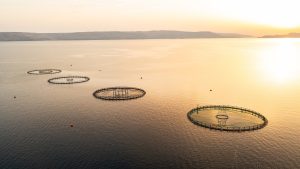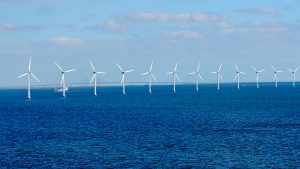Mark J Spalding, President of The Ocean Foundation, discusses how investing in innovative ocean companies can maximise returns and help to make the world a better place.
The Ocean Foundation and its partners are developing regenerative opportunity investment portfolios by focusing on transitions resulting from, or in response to, change. This includes structural shifts related to environmental degradation, societal evolution, and technological innovation. Building credible new portfolios grounded in sustainability is challenging due to the dependence on the reputation of all partners involved in any efforts to improve the economic, social, and environmental wellbeing of human communities and the resources they depend on. Global ocean innovation is the key to human adaptability, as these transformative changes are coming. Innovative ocean economy companies can produce greater shareholder returns and build ecological and social resilience. Investors can use innovation as a hedge against inflation and a potential path to outperforming the market over the long term.
Why focus on innovation?
Innovation can be thought of as applying new ideas, methods, or products in a way that results in a beneficial change. Innovation involves the origination of a new thing – its conception and development – and the pioneering adoption. While traditional investing has focused on trying to understand the potential future earnings of a business, knowing that a company focuses on developing and cultivating innovation can be a better way for investors to predict the long-term potential earnings of that company. The internet and its continued global expansion are causing a secondary acceleration of innovation adoption. Because of this, we can expect innovation cycles to become more frequent and cause faster and more extreme change.
How do we seek to capture ocean innovation?
Our approach to investing in innovation has been honed through more than 15 years of ocean-centric thematic investing. To select our themes, sub-themes, and companies, we have studied the history of innovation, which results from a series of recurring properties, patterns, and habits that sustain or encourage innovation. We then look to identify dynamic companies that are actively engaged in innovation across those subthemes and prioritise those that we believe will be able to cultivate innovation and drive its adoption.

We focus on larger, more established companies that are good at improving what they have been good at doing. For them, innovation can be sustaining: it keeps a company healthy and ahead of its competition. In addition, we will watch for disruptive innovation, which is often led by new firms with radical new methods, products, or ideas. However, disruptive firms will play a lesser role in the portfolio because we believe their path to continuing innovation is much less predictable – until it is not, at which point we will be ready for them.
As we look for sustaining or disruptive innovation, we also screen for companies capable of embedding equity in those innovations. Only with embedded equity can the innovation-focused portfolio truly achieve the multi-pronged benefits we seek.
Innovation themes and sub-themes
The Ocean Foundation and our partners developed the following list of four possible driving themes and then defined sub-themes looking at trends linked to the need for solutions, evolution, or changes that we believe are already inspiring, enabling, and accelerating innovation.
- Ocean conservation presents significant investment opportunities due to unprecedented ecosystem threats. Technological solutions like advanced satellite monitoring, artificial intelligence (AI)-powered tracking systems, and blockchain-enabled supply chain transparency can help enforce fishing quotas and reduce illegal maritime activities. Bioengineered filtration systems, precision agricultural technologies, and advanced wastewater treatment methodologies can also help reduce nutrient loading caused by agricultural runoff and urban waste. Technological interventions can monitor and mitigate coastal and offshore development impacts using remote sensing, predictive ecological modelling, and sustainable engineering practices. Entrepreneurs and impact investors are developing solutions like marine habitat reconstruction technologies, renewable offshore energy systems, and real-time monitoring platforms. These innovations offer potential financial returns and are crucial tools for preserving marine biodiversity, supporting global food security, and maintaining the ocean’s role in climate regulation.
- Ocean pollution is a growing concern that can be addressed through technological innovation. Sustaining innovations, such as advanced filtration systems and plastic recycling processes, are improving waste management. Disruptive innovations, such as AI-powered ocean-cleaning drones and biodegradable materials, offer transformative potential. These technologies address environmental issues and present significant economic value driven by regulatory pressures and global sustainability commitments. The most promising investment domains include technologies addressing seismic and acoustic pollution, waste disposal solutions integrating circular economy principles, and advanced chemical pollution detection and remediation systems. Venture capital and impact investment funds are interested in scalable solutions that generate financial returns and measurable environmental benefits, making ocean pollution prevention a strategic investment frontier with substantial long-term growth potential.
- Climate change is expected to significantly impact ocean economy sectors, including aquaculture, fisheries, tourism, and hospitality. Changes in water quality and weather conditions could lead to reduced operations and employment, shifting communities from extractive industries to conservation and eco-tourism models. Climate policy will trigger new strategies like a more circular economy, and investment opportunities will expand significantly. However, there may be inequity between developing countries with resource constraints and developed countries with research and innovation capacity. Investing in decarbonisation is crucial for combating climate change and moving towards a sustainable future. Supporting clean energy projects, green technologies, energy efficiency, and sustainable practices can reduce environmental impact and position investors at the forefront of a rapidly expanding market. Transportation innovations like electric vessels, autonomous technologies, and smart transportation systems can drive progress in mobility, efficiency, and sustainability, improving human health and mitigating climate change. The transition from traditional offshore oil and gas production to marine renewables is expected to create new opportunities in emerging energy fields, particularly in countries with strong R&D capabilities.
- Technology innovation is transforming industries, improving efficiency, and addressing global challenges. Investing in technologies like artificial intelligence, digitisation, automation, and material science can enhance productivity, reduce operational costs, and gain a competitive edge. Automation and robotics can streamline processes, minimise human errors, and unlock new levels of efficiency, leading to increased profitability and sustainable growth. Digitisation is crucial for staying relevant in the digital age, enabling businesses to streamline operations, enhance customer experiences, and access valuable data insights. Material science innovations create stronger materials and improve energy efficiency and sustainability. AI offers unprecedented opportunities to revolutionise industries and unlock valuable insights from vast datasets.
Emerging innovative blue economy sectors
All ocean economy sectors should be part of the blue economy, and the need for sustainable use will drive their redevelopment. Innovative emerging sectors have significant potential as they are at the forefront of new industries. They will likely see increased profits, social and environmental improvement, and potentially outsized shareholder returns. Novel designs and more human-centric operational procedures will drive a need for new suppliers.
Widespread ocean literacy underpins the blue economy. Understanding ocean systems forms the basis for innovation and developing new sectors. Success requires understanding the role of international governance structures, communications, and marketing strategies and how communities can be engaged in adopting emerging technologies. Improved marine management and governance designs are crucial for regulating emerging innovations and new goods and services, preventing market complications and unintended harm to the ocean and coastal communities.
Key ocean economy sectors include:
- Aquaculture and fisheries: The conservation of wild fish stocks and increased reliance on aquaculture production necessitate the development of new technologies and manufacturing innovations.
- Marine renewable energy: Marine renewable energy, including offshore wind and ocean energy projects, is an emerging and rapidly growing sector due to investment flows and the demand for new technologies and manufacturing innovations. It requires new solutions.
- Marine transport and ports: Onshore facilities have already invested in ‘clean port’ technologies to reduce air pollution and improve efficiency. Emerging industries such as marine renewable energy, aquaculture, biotechnology, and geoengineering climate solutions are transforming marine transport and ports, requiring new specialised infrastructure, logistics, and services. Ports must adapt to offshore wind project support by developing new turbine assembly and maintenance facilities. Aquaculture and deep-sea mining require advanced logistics solutions, specialised vessels, and enhanced port capabilities to handle new cargo types. These changes will foster innovation in port operations, vessel management, and supply chain optimisation while pushing for sustainable, efficient, and tech-driven port systems.
- Marine research: Marine research and innovation are crucial for the maritime economy, driving advancements in ocean technologies such as biotechnology, deep sea exploration, and satellite-assisted monitoring systems. These technologies and sustainability initiatives are driving growth and adapting to global challenges. Bioprospecting, an emerging sector, presents real opportunities in marine biotechnology, while artificial intelligence can aid in research and time management investments.
- Marine and ship construction: Innovation in the design, manufacturing, and construction of coastal and port infrastructure, renewable energy equipment, and shipbuilding is critical to improving resilience and adaptation and to transitioning, supporting, and establishing innovative enterprises in this sector.
- National defence: National security influences scientific and technological innovation amid international tensions, creating an economic framework that influences innovation. Even beyond naval defence needs, the sector has high innovation levels and a crucial role in ocean domain awareness and maritime security. As automation advances, it may increase employment in technology firms that support naval needs, from navigation to operations to meteorological forecasting. Reducing human-run military vessels will likely be slow as the existing fleet production lines represent significant embedded investment and, thus, will likely occur at the pace of decommissioning.
Ocean-centric innovation: A multidisciplinary approach
Ocean-centric innovation investing is a strategy that combines technological advancement, environmental concerns, and societal transformation to create a more sustainable blue economy. This approach focuses on companies that drive sustainable innovation in technology, healthcare, wellbeing, demographic shifts, and decarbonisation. Emerging sectors such as aquaculture, marine renewable energy, marine research, and marine construction offer promising opportunities for innovation and positive environmental and social outcomes. Focusing on regenerative opportunities ensures portfolio companies minimise harm while actively contributing to ocean ecosystem regeneration and building shareholder value.
Successful investing in the ocean economy requires a deep understanding of innovation patterns and ocean-specific dynamics. By focusing on established companies with sustained innovation capabilities and staying alert to disruptive newcomers, investors can build resilient portfolios that capitalise on the ocean economy’s growth while contributing to its sustainable development.

Integrating equity considerations into innovation assessment ensures that investments generate financial returns and contribute to inclusive economic growth. This approach acknowledges that sustainable ocean innovation must benefit all stakeholders while preserving and enhancing marine resources for future generations. Ocean-centric innovation investing offers a pathway to participate in and shape the future of our blue economy.
About the author
Mark J Spalding (J.D., M.P.I.A.), President of The Ocean Foundation, is a Senior Fellow at the Center for the Blue Economy, a member of the UNEP Guidance Working Group for its Sustainable Blue Economy Finance Initiative, and an advisor to various ocean-centric investment funds. He is an international ocean policy, law, philanthropy, finance, and investment expert.
Please note, this article will also appear in the 20th edition of our quarterly publication.





